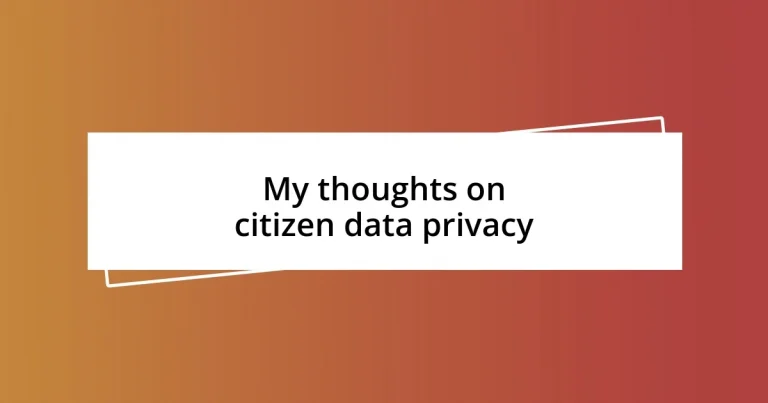Key takeaways:
- Citizen data privacy involves understanding how personal information is collected, used, and accessed by governments and organizations, highlighting the need for individual actions to safeguard privacy.
- The rise of cyber threats, lack of awareness about data rights, and the importance of data privacy foster trust between citizens and organizations.
- Legal frameworks like GDPR are essential for protecting data rights, but ongoing updates are necessary to keep pace with technology and ensure effective privacy protection.
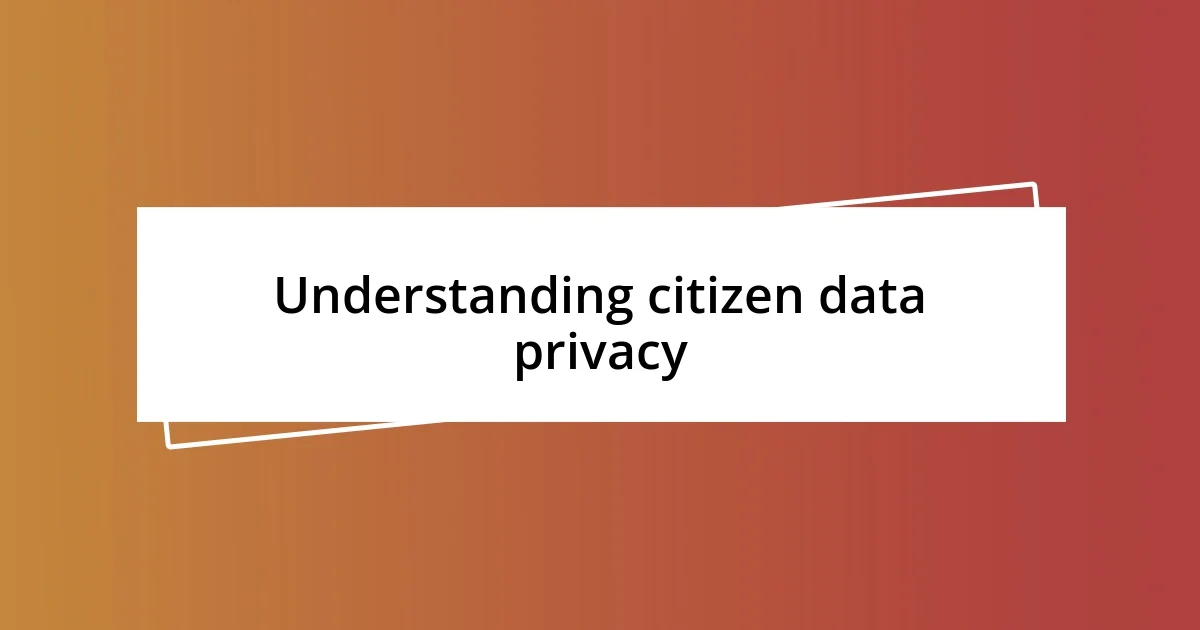
Understanding citizen data privacy
Citizen data privacy is a concept that revolves around the protection of personal information collected and used by governments and organizations. I remember feeling a mix of anxiety and curiosity when I first learned how much data is harvested every day—from my online shopping habits to my social media likes. It made me wonder: how much of my digital footprint is actually private?
As I navigated through my concerns, I realized that understanding citizen data privacy goes beyond just knowing what data is collected; it’s about recognizing how that data is used and who has access to it. I often find myself questioning the motives behind data collection. Are companies genuinely trying to enhance user experience, or are they simply capitalizing on our information?
In my own life, I’ve taken deliberate steps to safeguard my personal data, like adjusting privacy settings on social media platforms. It’s empowering to know that even small actions can significantly impact my data privacy. Still, I can’t help but reflect on the broader implications—if we all value our privacy, why does it feel like we’re racing toward a future where it’s becoming increasingly elusive?
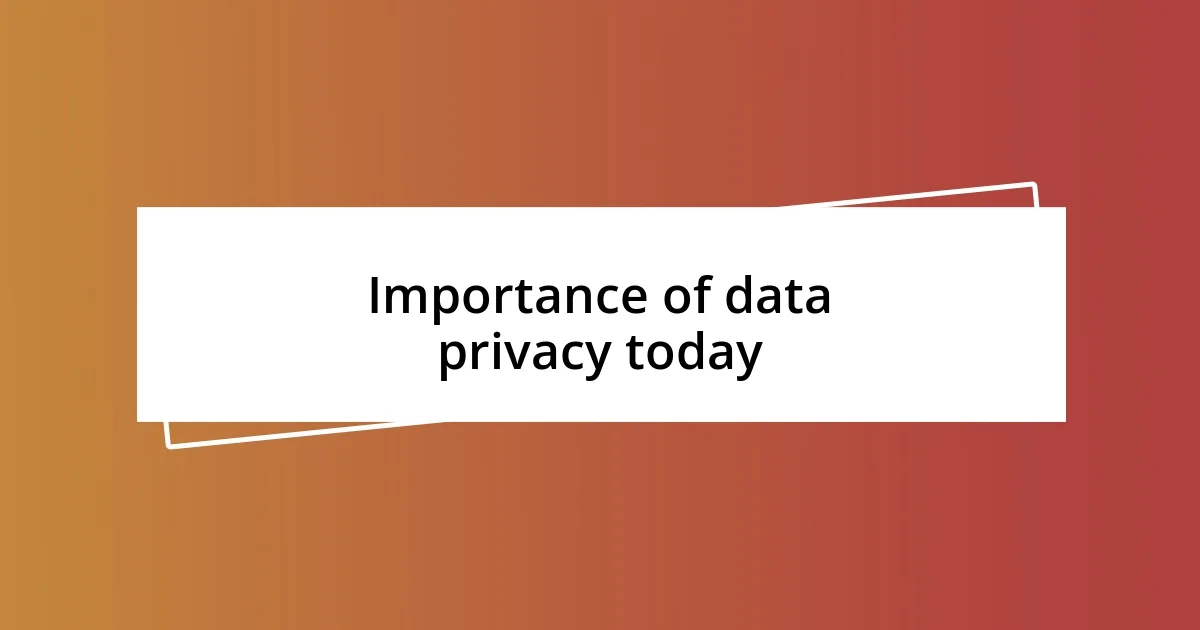
Importance of data privacy today
Data privacy today has become crucial as our lives increasingly intertwine with digital platforms. Just the other day, I received an email alert from a retailer notifying me of a data breach involving customer information. It hit me hard—I realized how my personal data is often left vulnerable to cyber threats. Protecting this information is no longer just a personal concern; it’s a collective responsibility that we all share.
- Increased Cyber Threats: With hacking incidents on the rise, personal information is at risk more than ever.
- Trust in Institutions: Data privacy fosters trust between citizens and organizations—without it, our faith in services dwindles.
- Empowerment: Understanding our data rights empowers us to make informed decisions about sharing our information.
- Legislation Changes: Laws like GDPR have shown that protecting data is essential, yet many still remain unaware of their rights.
- Personal Impact: I often reflect on how easily my data could be misused, which adds a layer of caution to every online interaction I have.
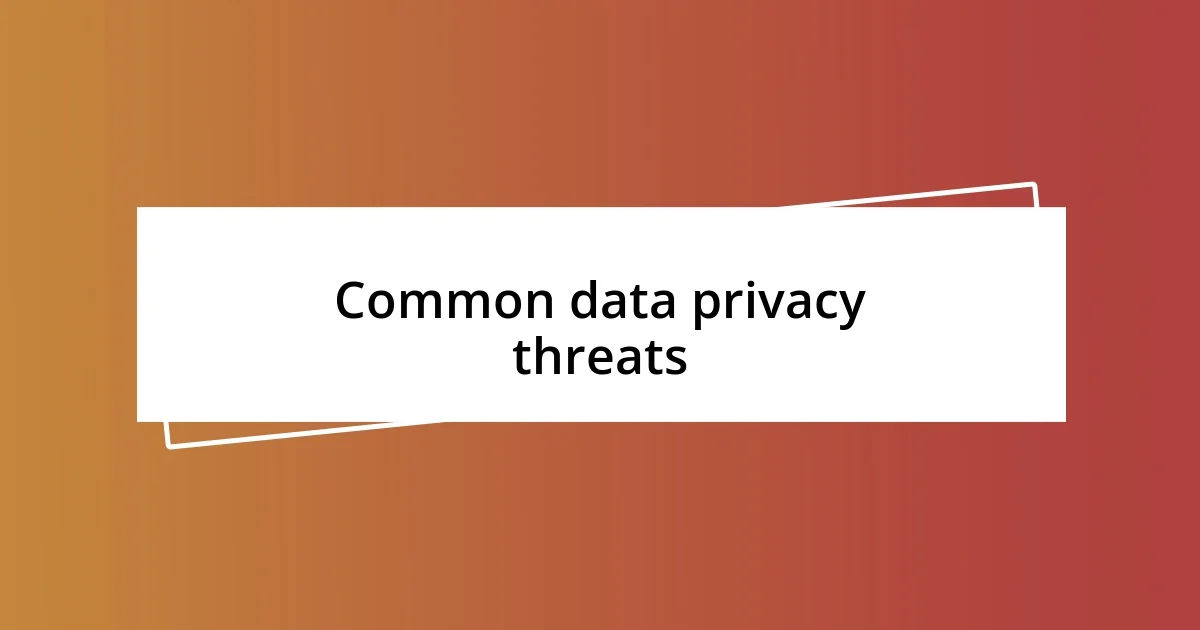
Common data privacy threats
When I think about common data privacy threats, several types come to mind that we all need to be aware of. One significant threat is phishing attacks. I remember receiving an email that looked almost identical to a trusted source, asking me to click a link to verify my account. It was only after a gut feeling told me to look closer that I realized it was an attempt to steal my credentials. Phishing can happen to anyone and often capitalizes on our trust and urgency.
Another common threat is data breaches. These incidents have become alarmingly more frequent. When a major online retailer I used to shop with announced they had suffered a breach, I felt a wave of vulnerability wash over me. The realization that my financial and personal information could be exposed added a layer of anxiety to my shopping habits. It was a wake-up call, making me rethink how often I share data online.
Finally, let’s not forget about unauthorized data sharing. Apps often request access to more information than they need. I once downloaded a seemingly harmless game, but the permissions it requested were overwhelming. While I love a good game, I was left questioning whether my location and contacts really needed to be part of the experience. It shows how sometimes, convenience can overshadow privacy, and each of us needs to be vigilant.
| Data Privacy Threat | Description |
|---|---|
| Phishing Attacks | Deceptive attempts to steal personal information through fake emails or websites. |
| Data Breaches | Unauthorized access to personal information often held by organizations. |
| Unauthorized Data Sharing | Apps and services requesting more access than necessary, risking privacy. |
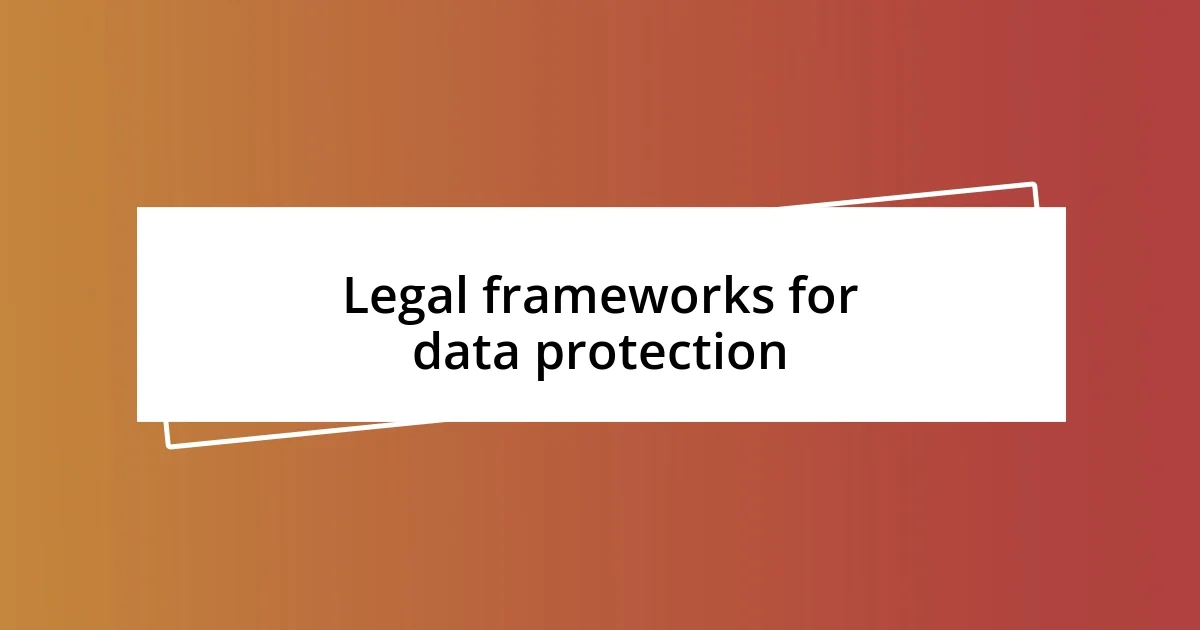
Legal frameworks for data protection
Legal frameworks for data protection have become increasingly important in mitigating risks associated with data breaches and unauthorized access. I often find myself pondering, how well do we understand the laws designed to protect our information? The General Data Protection Regulation (GDPR) in Europe is a shining example of comprehensive legislation aimed at safeguarding citizens’ privacy rights, influencing similar laws worldwide.
In my experience, many people are unaware of their rights under such frameworks. When I learned about my right to access my personal data held by companies, it sparked a sense of empowerment. Wouldn’t it be refreshing if more individuals took the initiative to ask how their data is being used? Knowing that one can request data erasure or rectification transforms the way we view our interactions with corporations.
Additionally, the evolving nature of technology necessitates constant updates to these legal frameworks. For instance, after witnessing the rise of technology companies mishandling data, I realized that the laws must keep pace with innovation. If regulations aren’t flexible, how can we expect them to protect us effectively? It’s a call for ongoing dialogue between lawmakers, businesses, and citizens to ensure our privacy is not only a right but a reality.












